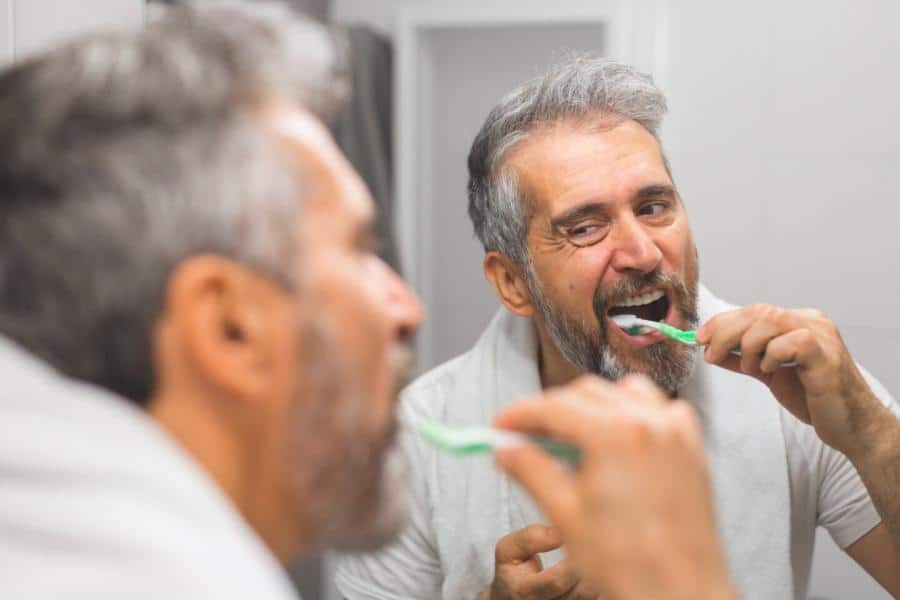In your 40s, there are various oral health problems you may face. For instance, your gums may start receding. This leaves gaps between your teeth, allowing bacteria to build up hence tooth decay. With age, you may also lose some teeth or succumb to oral cancer. Additionally, you may develop bad breath. All these issues deprive you of your cute, healthy smile.
Fortunately, most of these mishaps are preventable, if only you take the necessary preventive measures. This article outlines tips you can use while in your 40s to avoid oral problems:
1. Go For Dental Veneers
Dental veneers are tooth-like shells made of porcelain or resin-complex material. They’re permanently bound into your front teeth in case they’re broken, discolored, chipped, or missing.
They improve your teeth’s appearance, thus improving your confidence. Before getting one, your dentist examines the defects in your teeth and recommends the appropriate dental veneer shape and type you need. This is to ensure your veneers fit nicely onto your teeth.
2. Eat Healthy Diets
A well-balanced diet boosts the health of your teeth and gums. You should take foods rich in vitamins and minerals as they inhibit gum diseases. Also, ensure you take calcium-rich foods and drinks, such as milk and yogurt. This makes your teeth and gums strong.
You’d want to avoid sugary foods and acidic drinks because they destroy the enamel that safeguards your teeth. This exposes them to bacteria leading to tooth decay. Also, try to choose your snacks wisely, making sure you eat the healthy ones and shun the unhealthy ones. An example of a healthy snack is carrots, which contain minerals that eliminate plaque from your teeth.
3. Visit Your Dentist Regularly
In your 40s, your oral health becomes somewhat complicated. Therefore, making regular visits to your dentist is vital. It enables them to detect and address any possible issue. Also, they're able to guide you on how you may take good care of your teeth as you age.
Furthermore, regular visits are beneficial to you in the following ways:
- Minimizes the dangers of developing chronic diseases
- Reduces dental costs in the long run. This is because preventive services are cost-friendly compared to curative ones.
- Prohibits bad smell
- Hinders cavities, which may lead to missed teeth and decays
4. Brush Your Teeth After Every Meal
Brushing your teeth after every meal eliminates bacteria buildup. This prevents tooth decay and gum diseases. In addition to brushing, remember to floss at least once daily. This helps you to get rid of plaque between your teeth. If you don't remove the plaques, you may contract gum diseases, resulting in tooth loss. Here's How to clean your teeth - Step-by-Step Guide
5. Keep Your Mouth Moist
Saliva plays a significant role in your oral health. For instance, it fights bacteria in your mouth and prohibits a bad smell. Also, it contains proteins and minerals that safeguard teeth enamel and hinders gum diseases and tooth decay.
However, while in your 40s, your saliva reduces. To keep your mouth moist, you need to:
- Drink enough water
- Chew sugarless gum
- Avoid smoking
- Use a humidifier
- Avoid taking alcohol
- Brush your teeth after every meal
- Suck on sugarless, hard candy
- Go for saliva replacement products
- Drink decaf coffee
6. Address Gum Diseases
Gum diseases such as gingivitis are among the most common ailments to pay attention to in your 40s. As you age, your gums begin to recede, revealing the roots of your teeth. This augments sensitivity and encourages more bacteria to grow.
Some signs and symptoms of gingivitis include:
- Puffy or red gums
- Sensitive gums
- Receding gums
- Bleeding gums after brushing or flossing
- Bad breath
Here are some methods you may use to prevent gingivitis:
- Reduce your sugar intake
- Brush your teeth at least twice daily or after every meal
- Floss every day
- Use natural mouthwashes
- Visit your dentist more often
- Use a particular toothbrush for only three months
- Practice good oral hygiene
Addressing gum diseases ensures they’re healthy and healthy gums means strong teeth.
7. Change The Type Of Your Toothbrush And Toothpaste
In your 40s, your gums and teeth may not be as strong as in your 20s. Therefore, you wouldn’t want to use the same toothbrush as a 20-year-old, as you may harm your teeth. It’s advisable to use a soft-bristled brush with long handles or an electric one. The soft bristles ensure your gum and enamel are well protected. On the other hand, an electric toothbrush enables you to brush your teeth with reduced pressure and still clean your teeth well.
Conclusion
Being in your 40s isn’t a reason to compromise your oral health. You can implement the dental care best practices outlined above. Remember that, as you age, your gums and teeth also do. Therefore, you need more tactics than a youngster to keep them in excellent condition. Ultimately, you’ll regain the confidence and smile you had while still young.


